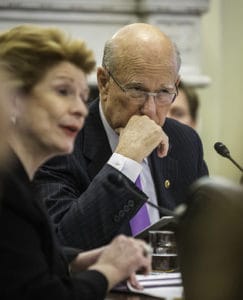Should Corporate Agribusiness Lobbyists and Money Drive Organic Policy?
 |
Pat Roberts (R-KS) Source: USDA |
Representatives of the largest trade associations in the beef, pork, turkey, and egg industries testified before the Senate Agriculture, Nutrition and Forestry Committee. They told Chairman Pat Roberts (R-KS) and ranking minority member Debbie Stabenow (D-MI) absolutely the opposite of what family farmers, if they had been invited to attend, would’ve stated.
Representatives from the National Cattlemen’s Beef Association, United Egg Producers (UEP), National Pork Producers Council, US Cattlemen’s Association and the National Turkey Federation were all singing out of the same hymnal (and the elected representatives present joined in perfect harmony).
And what were all these lovebirds squawking about? In unison, their messaging was:
- Block any attempts for meaningful GMO labeling
- Exempt livestock products, fed GMOs, from any future possible labeling requirements
- Block the administration’s efforts to implement protections for family farmers in the marketplace (Grain Inspection, Packers and Stockyards Administration or GIPSA)
- Force the EPA to quit picking on farmers in terms of environmental protection
- A strong protest, in unison, was heard concerning the proposed USDA organic animal welfare rules. As weak as these rules are, they were still 100% unacceptable (even the anemic requirement for 1.5-2 square feet per chicken outdoors is too much for the factory farm operators)
So the bottom line is: who should influence the laws for all of food production in this country, and specifically the rules for the organic industry?
True organic practitioners (along with their dedicated customers), working with the National Organic Standards Board (set up by Congress to vet organic materials and rulemaking), or the corporate lobbyists and powerful congressional representatives in each party who they have bought off?
Some of the high points from testimony included:
- There are a hundred million birds producing eggs in this country with 30% of them now cage-free. Half of those cage-free birds (15 million) are producing organic eggs [mostly in confinement].
- By 2030, 60% will be cage-free (based on demands from food service).
- The industry witnesses called for “better economic analysis” by the USDA before any new rules on organic animal welfare are implemented.
- Porched poultry systems (solid floor structures with roofs) protect birds from exposure to Salmonella and Avian Influenza [It should be noted that the largest outbreaks in this country have been tied to giant concentrated animal feeding operations (CAFOs), not to family-scale farms that let their birds outdoors].
- $100 million has been invested in building giant “organic” structures with porches even though the law clearly states birds must have access to the “outdoors.” It was stated that land would be expensive to actually provide birds with outdoor access.
- Many organic egg companies will exit the industry and there will be a shortage if the rules are enacted [I say, “don’t let the door swing and hit you in the ass on your way out, thank you very much” — if some giant companies switch some of their houses back to conventional production, the marketplace will create incentives for more moderate operations to meet consumer demand].
- The powerful committee chairman, Mr. Roberts of Kansas, in a feeble attempt at humor, ridiculed the need for enhanced animal welfare standards for poultry by suggesting that the rules would require a “big yard” [again, we’re talking just 1 or 2 square feet for chickens, unlike in Europe where organic producers must provide 43 square feet], and he suggested that maybe the rule should require piping and music by Mozart.
Cornucopia staff will continue to demand the law protecting organic farmers, consumers, and livestock be enforced. To make your voice heard, please submit comments to the USDA on the pending rulemaking by visiting: https://www.cornucopia.org/usdas-proposed-animal-welfare-rule/
In the meantime, organic consumers and wholesale buyers can take the law into their own hands by visiting The Cornucopia Institute’s organic egg report and scorecard. Please spend your money wisely by rewarding the true heroes in this industry and simultaneously protecting your family by procuring the highest quality, authentic organic eggs: https://www.cornucopia.org/scrambled-eggs-separating-factory-farm-egg-production-from-authentic-organic-agriculture/

